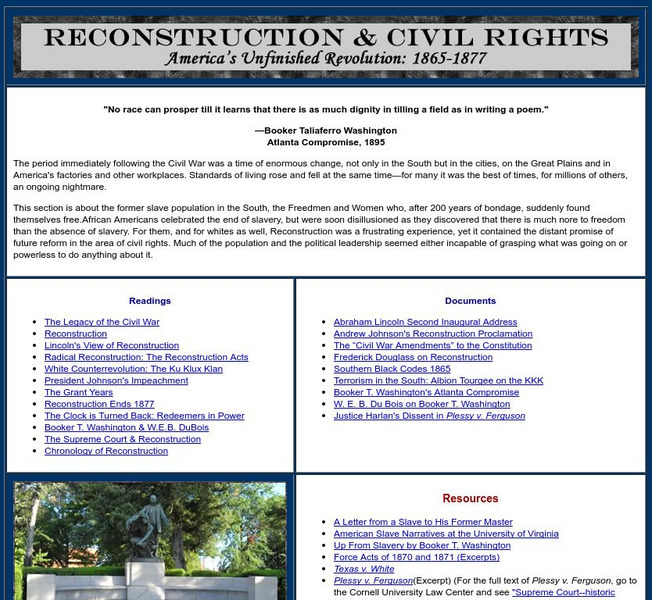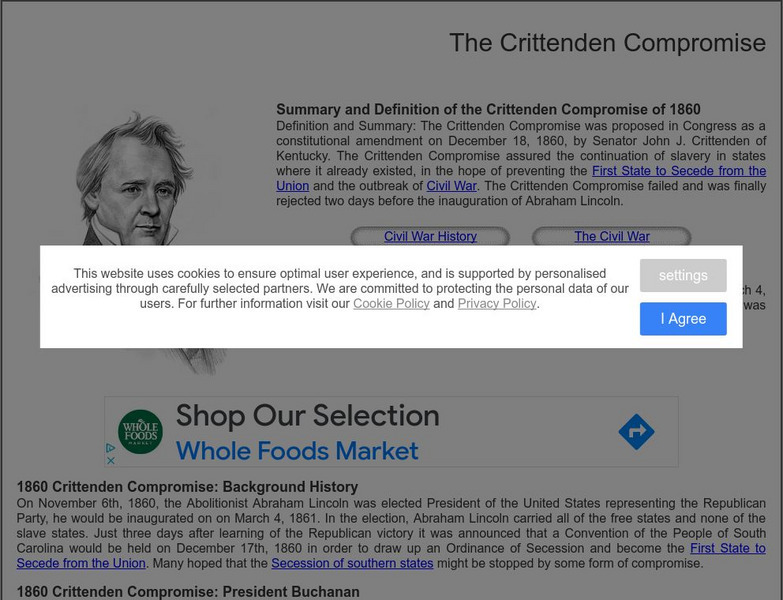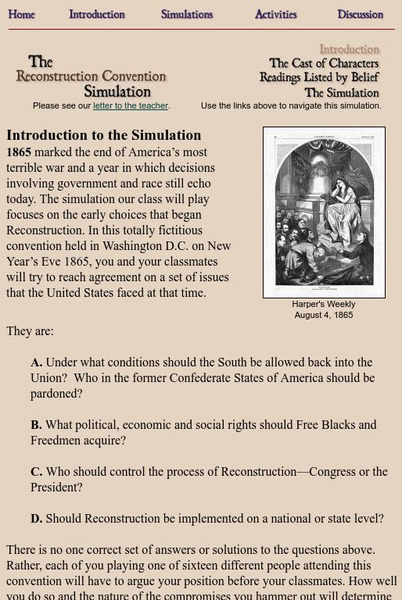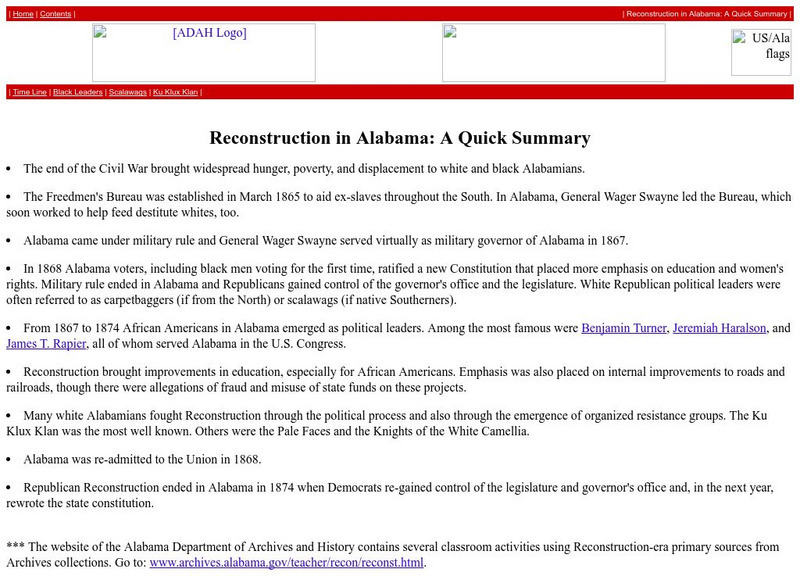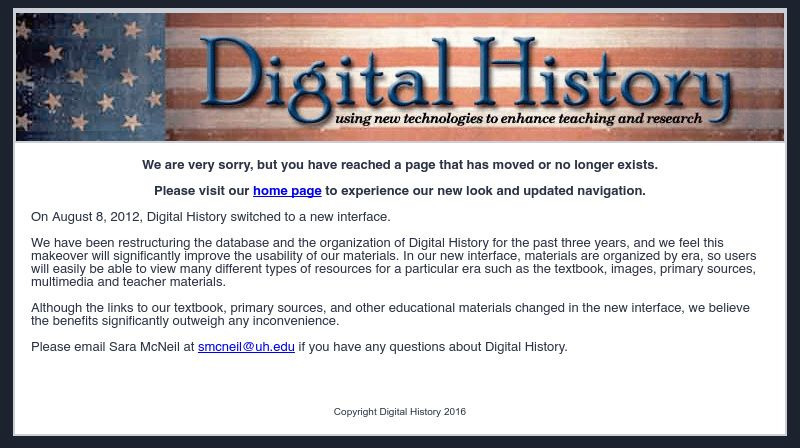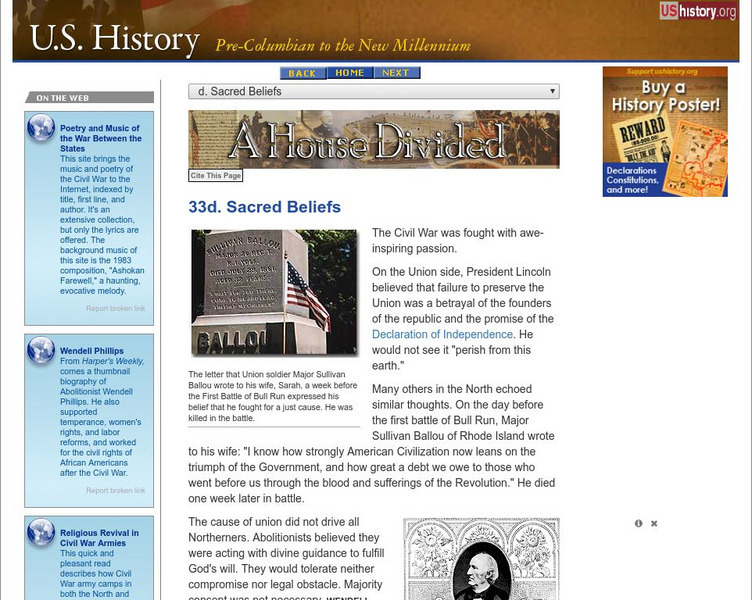Henry J. Sage
Sage American History: Reconstruction & Civil Rights
Following the Civil War in the United States came an era of reconstruction. The men and women who were freed from slavery were suddenly stuck trying to sort out all of the freedoms as well as new responsibilities they were facing. The...
Library of Congress
Loc: Slavery in the United States: Primary Sources
This lesson introduces students to primary sources- what they are, their great variety, and how they can be analyzed. The lesson begins with an activity that helps students understand the historical record. Students then learn techniques...
Louisiana Department of Education
Louisiana Doe: Louisiana Believes: Grade 7 Social Studies: Slavery Compromise
Students develop and express claims through discussions and writing which compare and contrast how the early compromises over slavery, including their effectiveness and impact on different regions of the United States.
National Endowment for the Humanities
Neh: Edsit Ement: Lesson 2: People and Places in the North and South
Lesson explores the causes of the Civil War and the basic disagreements between North and South through the use of primary source documents, photographs, and census information. Includes two detailed student activities and resources for...
Khan Academy
Khan Academy: Ap Us History: 1844 1877: Reconstruction: Life After Slavery
Discusses what life was like for African Americans who were freed from slavery after the Civil War. Includes questions for students.
Tennessee History For Kids
Tennessee History for Kids: Slavery and Tennessee's War
This website provides information about slavery in Tennessee.
Siteseen
Siteseen: Civil Conflict: The Crittenden Compromise of 1860
Web page on the Crittenden Compromise of 1860 which assured the continuation of slavery where it already existed in an attempt to appease Southerners and halt secession of Southern states from the Union.
Siteseen
Siteseen: Civil Conflict: The Corwin Amendment
Web page on the proposed Corwin Amendment which, if ratified, would have forbade Congress from interfering with states' right to make decision to slavery. Site contains textual information, video [3:28], and fun facts for students.
National Humanities Center
National Humanities Center: Teacher Serve: The Demise of Slavery
In this essay, J. William Harris, Professor of History at the University of New Hampshire, explains the developments that brought about the demise of slavery.
Digital History
Digital History: Civil War in Kansas [Pdf]
The Compromise of 1850 did not solve all the slavery issues in the territories, which was not surprising. Read about the Kansas-Nebraska Act, put forth by Sen. Stephan Douglas, who proposed that the issue be decided by popular...
Digital History
Digital History: The Civil War Begins [Pdf]
The election of 1860 showed the deep divisions that split the country. With four candidates representing four very different approaches to the issue of slavery, the outcome resulted in the secession of South Carolina, followed eventually...
PBS
Pbs Learning Media: Primary Source: The Life of a Slave Girl by Harriet Jacobs
This collection uses primary sources to explore Incidents in the Life of a Slave Girl by Harriet Jacobs.
PBS
Pbs Learning Media: Primary Source Set: Uncle Tom's Cabin Harriet Beecher Stowe
This collection uses primary sources to explore Harriet Beecher Stowe's Uncle Tom's Cabin.
Other
The Spread of u.s. Slavery, 1790 1860
Presents population maps of enslaved and free African Americans before the Civil War based on census population.
PBS
Pbs: Africans in America: Slavery and the Origins of the Civil War
An article by Columbia University historian Eric Foner that discusses how long-standing views of the role of slavery in America began to be challenged during the civil rights era of the 1960s by a new generation of historians, whose work...
PBS
Pbs: Slave to Sharecropper
This collection of resources examines the life and work of freed slaves after the Civil War. Includes questions and answers on sharecropping in the American South, as well as a personal account from a former slave who became a sharecropper.
Department of Defense
Do Dea: Ap Us History: Unit 4: A House Divided
This extensive learning module examines how the United States became more connected with the world as it pursued an expansionist foreign policy, became the destination for many new immigrants, and encouraged migration to the Pacific...
Harp Week
Education at Harp week.com: The Reconstruction Convention Simulation
A simulation activity where students participate in a convention at the end of the American Civil War that never actually took place. Together they grapple with the issues that faced America in 1865 in dealing with the demise of slavery...
Other
Alabama.gov: Reconstruction
Learn facts about life in the state of Alabama after the Civil War.
Digital History
Digital History: Pre Civil War South
A comprehensive look at the economy of the South and the changes brought by the cotton gin. Read through five pages that discuss the economy, the tradition of the plantation, and the sectionalism that arises in this time period.
Independence Hall Association
U.s. History: Sacred Beliefs
At the beginning of the Civil War people in both the North and the South held firm beliefs about the reasons for the war. Some wanted to preserve the Union, others to end slavery. In the South the question was about states' rights and...
CommonLit
Common Lit: "A Nation Divided: North vs. South" by Us history.org
The American Civil War was fought within the United States from 1861 to 1865. The election of President Abraham Lincoln in 1860 increased tension between the North and South. Lincoln's political party was interested in stopping the...
Curated OER
National Park Service: The Significance of the Dred Scott Trial
In this article from "The Old Courthouse" by Donald Dosch the facts of the Dred Scott decision are laid out. Read why the outcome of the case fanned the embers of the coming Civil War.
CommonLit
Common Lit: Abolishing Slavery: Efforts of Frederick Douglass and Abraham Lincoln
A learning module that begins with "Abolishing Slavery: The Efforts of Frederick Douglass and Abraham Lincoln" by Mike Kubic, accompanied by guided reading questions, assessment questions, and discussion questions. The text can be...
Other popular searches
- Civil War Slavery Dance
- Post Civil War Slavery
- Civil War Slavery Geogrpahy
- Slavery and the Civil War
- Impact of Slavery on Civil War
- Slavery and Civil War
